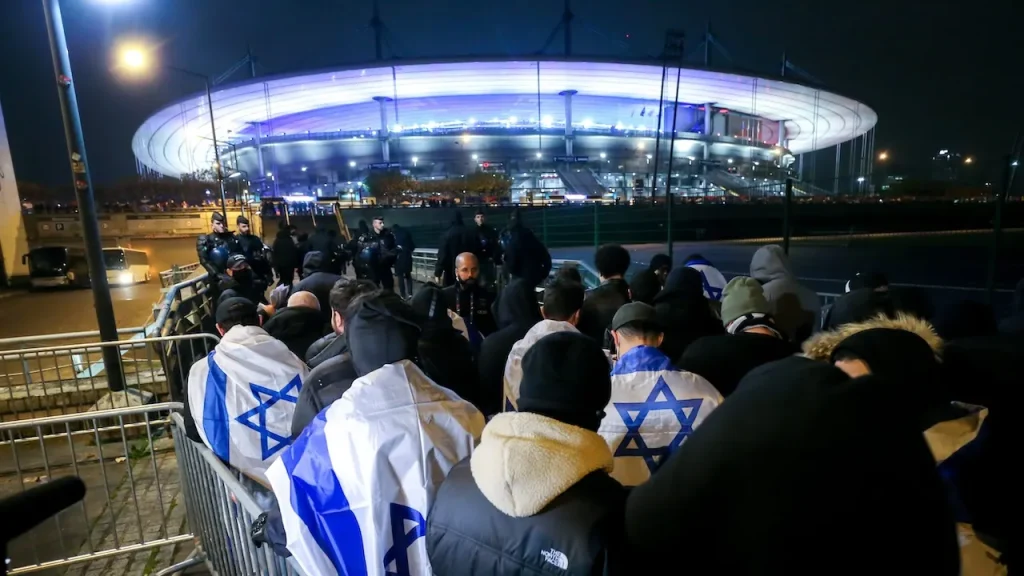Israeli Soccer Fans Banned from Europa League Match in Birmingham
In a decision that has sparked controversy, Aston Villa Football Club announced on Thursday that fans of Israeli team Maccabi Tel Aviv will be prohibited from attending the upcoming Europa League match in Birmingham, England on November 6. The English Premier League club cited safety concerns as the primary reason for the ban, referencing the violent attacks suffered by Maccabi Tel Aviv supporters in Amsterdam last year during a match against Ajax. “The club are in continuous dialogue with Maccabi Tel Aviv and the local authorities throughout this ongoing process, with the safety of supporters attending the match and the safety of local residents at the forefront of any decision,” Aston Villa stated. This announcement comes at a particularly sensitive time, as tensions around Israeli sports teams in international competitions have heightened in the wake of the Gaza conflict.
The Amsterdam incident that influenced this decision was a serious one – Maccabi Tel Aviv fans were targeted in violent attacks before and during their match against Ajax last year. The aftermath has seen more than a dozen people charged, with several already convicted for their roles in the overnight violence. These events have created a precedent of concern for the safety of Israeli supporters traveling to European matches, particularly in an environment where pro-Palestinian protests have become increasingly common at sporting events featuring Israeli teams. The upcoming match against Aston Villa represents Maccabi Tel Aviv’s first away game in the Europa League since facing protests in Thessaloniki, Greece, during their match against PAOK on September 24, where approximately 120 Israeli fans required police protection just to enter the stadium.
The broader context of this decision reveals the complex interplay between sports, politics, and security concerns in Europe. UEFA, European soccer’s governing body, had been considering a vote to suspend Israeli teams entirely from its competitions before the recent ceasefire in Gaza rendered that discussion temporarily moot. The situation highlights how sporting events have become flashpoints for expressing political sentiments related to the Middle East conflict, placing clubs, police forces, and governing bodies in difficult positions as they try to balance freedom of expression with security requirements. For Maccabi Tel Aviv and their supporters, this represents another hurdle in their participation in European competition, as they find themselves increasingly isolated on the international stage.
The London-based Jewish Leadership Council has strongly criticized Aston Villa’s decision, calling it “perverse” that away fans should be banned because local police cannot guarantee their safety. Their statement suggested that if Israeli fans cannot attend, then the match should be played behind closed doors without any spectators, effectively arguing that Aston Villa should face consequences for the decision rather than placing the burden solely on the visiting team and its supporters. This perspective raises important questions about fairness and responsibility in sports – is it appropriate to penalize one group of supporters while allowing others to attend? Does this approach effectively reward those who might threaten violence by giving them what could be perceived as a victory?
For the supporters of Maccabi Tel Aviv, this ban represents more than just missing a soccer match; it symbolizes a troubling trend of isolation and exceptional treatment. These fans, who simply wish to support their team in European competition like any other club’s supporters, find themselves caught in geopolitical crosscurrents beyond their control. The experience of the 120 fans who traveled to Greece only to be corralled by police before entering the stadium, and now the complete prohibition from attending the match in Birmingham, demonstrates how the conflict in the Middle East continues to impact seemingly unrelated aspects of life, including sports. The supporters’ frustration is understandable – while security concerns may be legitimate, the result is that they alone bear the consequences.
As the November 6 match approaches, questions remain about how this situation will unfold and what precedent it sets for future matches involving Israeli teams in European competitions. The decision comes at a time when the ceasefire in Gaza has offered some hope for de-escalation in the region, yet the ripple effects of the conflict continue to be felt in unexpected venues, including the sports arenas of Europe. While Aston Villa and local authorities prioritize safety, the balance between security concerns and equal treatment of all fans presents an ongoing challenge with no easy solutions. As sports and politics continue their uneasy relationship, the experiences of Maccabi Tel Aviv and their supporters serve as a reminder that even the “beautiful game” cannot escape the complexities of our divided world.


